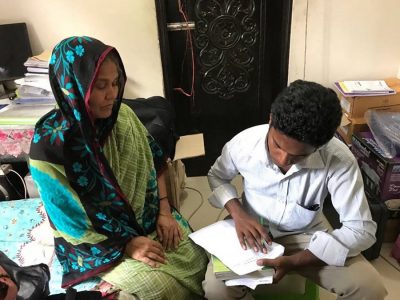Join the Leading Global Eye Health Alliance.
Membership-
Choose an alternate language here
Integrating gender into eye health services: Through the Lens of WHO’s 6 Pillars of Health
The Fred Hollows Foundations follows the World Health Organisation’s ‘6 Pillars of Health’ to achieve the Seeing is Believing project’s objective of increasing demand for services and provide services with gender equity in Barisal Division. The six pillars as mentioned below are: service delivery, health workforce, equipment and infrastructure, financing, leadership and governance, and health information systems.
FHF brings eye care services at the doorstep of women beneficiaries through outreach programs for women. Moreover, there is an equal access to the Out-Patient Department (OPD) through a gender alternate queue system. An innovative gender strategy for the project has also been developed to build gender equitable eye health systems in Barisal division. Additionally, school students, with a priority on female students, are provided free eye screening and spectacles. Pilot testing has been initiated in Nalcity and Rajpur, which focussed on group travel recommendations to ease the trouble of conveyance for elderly and women patients, and we hope to repeat this initiative in other project areas.
Training is regularly provided to health workers on gender equitable service delivery. Gender sensitivity training and workshops have also been held for doctors and nurses of FHF’s partner hospitals. Training has also been provided to pharmacists and the referral system between pharmacists and the nearby medical facilities is being strengthened through constant monitoring visits. Moreover, patients are provided counselling where they are instructed on the do’s and don’ts post-surgery.
The equipment and infrastructure of government partners are constantly monitored and have been renovated accordingly. As FHF strongly emphasises on gender sensitivity, privacy is always maintained during surgeries and OPD at base hospitals. While gender sensitivity training has been provided to all staff of partner hospitals, the project also works on making the facilities at the hospitals women friendly. Infant nursing corners and women friendly waiting spaces, for example, have been established in partner hospitals to ensure their comfort and ease.
Subsidised cataract surgeries is provided for the underprivileged while the ultra-poor can get access to free of cost services.
Female members have been included in the Divisional Steering Committee while emphasis is given on the inclusion of female community leaders and cascade trainers.

A strong health information system has been developed which focuses on the number of cataract patients, number of dropouts, number of cataract surgeries, trend analysis, age and economic class disaggregation, and gender segregated data.
This data analysis helps with improving the service delivery of the project and focus on the areas and challenges that need work.
Zareen Khair
Country Manager
FHF Bangladesh